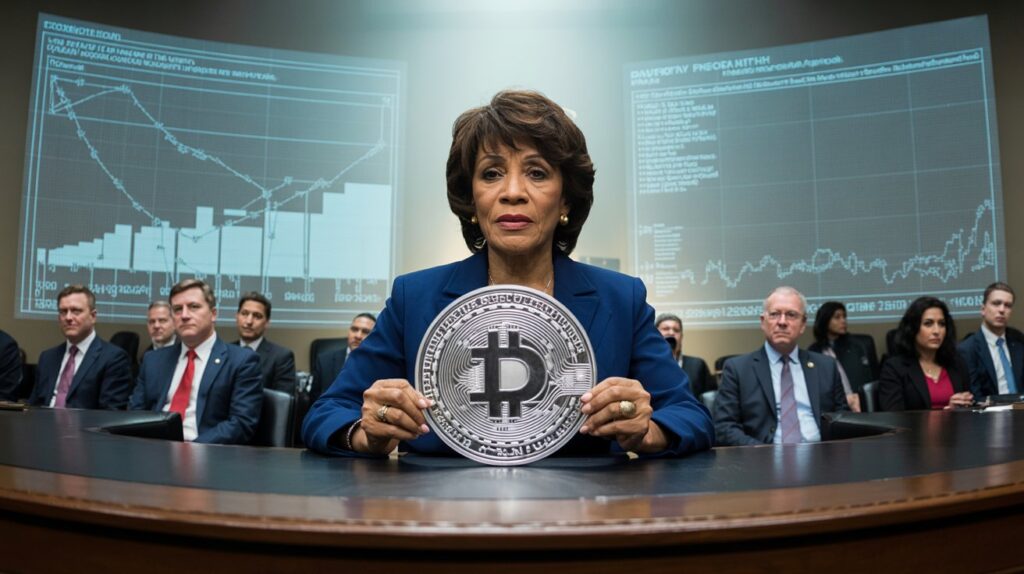
TL;DR
- House Democrats secured an extra “minority day” hearing on the Clarity Act, renewing scrutiny of Trump crypto conflicts
- Witnesses raised concerns about cybersecurity loopholes, regulatory arbitrage, and potential memecoin fraud
- Republicans argue the status quo offers no protections, urging structural clarity
The House Financial Services Committee held a surprise bonus hearing on the Digital Asset Market Clarity Act, underscoring deep divisions over crypto regulation. Ranking Democrat Maxine Waters urged the session, prioritizing scrutiny of President Donald Trump’s crypto interests, while members disagreed sharply over consumer protections, cybersecurity, and enforcement authority.
Waters Targets Trump’s Crypto Ties
In her opening remarks, Representative Maxine Waters (D‑CA) directly questioned whether Trump was seeking personal gain from his crypto ventures, alleging he is using presidential office to enhance profits. “The crooked president … decided to use the office of the presidency to enhance his access to profits,” Waters said, emphasizing her opposition to the legislation.
This line of attack traces to concerns over Trump-backed projects such as World Liberty Financial and the $TRUMP memecoin. Witness Bart Naylor, of Public Citizen, claimed Trump was “selling favors” through memecoin events and has “terminated SEC lawsuits against companies which donated money to him”.
Republican Rebuttal: “No Framework Means No Protection”
Republicans argued that without legislation, crypto remains unregulated, leaving no federal oversight for non-security digital assets. Financial Services Chair French Hill and members Bryan Steil and Warren Davidson emphasized that the legislation provides “rules of the road” that currently do not exist.
Hill asserted, “Part of the reason we are still talking about the digital asset market today is that both the SEC and Congress did not rise to the occasion … to protect investors.”
Technical and Structural Gaps Highlighted
Several prominent witnesses raised core concerns:
- Carole House of Atlantic Council warned that the Clarity Act fails to address cybersecurity threats, citing recent ByBit hacks as case studies.
- Amanda Fischer of Better Markets flagged that the bill allows crypto firms to pick CFTC over SEC regulation, potentially dodging investor protection laws.
- Representative Jim Himes (D‑CT), one of the few Democratic proponents, cautioned that the Clarity Act may contain loopholes that let issuers avoid oversight based on their legal classification.
The Stakes: Protecting Investors or Enabling Risks?
Much of the debate hinges on whether the bill balances innovation with protection. Democrats argue that the Clarity Act lacks essential securities oversight, stating it may allow crypto firms to choose more lenient regulators and sidestep federal oversight.
Notably, Carole House noted that without addressing cyber threats, the bill leaves open the door to exploits similar to hacks seen in major digital-asset platforms .
On the other side, Republicans, including Hill and Davidson, stressed that new regulations are imperative to prevent fraud, offshore migration, and lawlessness in the U.S. crypto industry.
Political Drama: Intersection of Crypto and Trump Era Impacts
Crypto policy is increasingly a tool in partisan strategy rather than just financial oversight.
- Waters and Senate Democrats are pushing for amendments, including conflict-of-interest prohibitions keyed to Trump’s crypto connections .
- Sally labeling of the legislation as “radically flawed” aligns with efforts to ensure Trump cannot profit from memecoins while in office .
- Republicans argue Democrats are using regulatory fear to block progress, warning that without action investors and U.S. market share may be left vulnerable .
Crypto Market Structure “Minority Day” Hearing
| Item | Details |
| Hearing Type | “Minority Day Hearing,” featuring Democrats’ selected witnesses |
| Legislation Discussed | The Digital Asset Market Clarity Act (Clarity Act / FIT21 successor) |
| Democratic Concerns | Trump crypto conflicts, cybersecurity loopholes, regulatory arbitrage |
| Republican Priorities | Closing regulatory gap for non‑security digital assets |
| Expert Witnesses | Atlantic Council, Better Markets, Public Citizen, former CFTC chairs |
| Markup Date | Scheduled next week |
| Status | Ongoing; high partisan tensions |
Next Steps & Potential Outcomes
The Clarity Act is set for markup next week, placing pressure on lawmakers to reconcile differences—particularly around security and oversight measures.
- Amendments expected include bills aimed at banning conflict-of-interest in crypto issuance and strengthening cybersecurity provisions.
- Potential Blocks: Democratic backlash—especially from Waters—might derail bipartisan support if Trump-linked issues aren’t resolved.
- Possible Compromise: Involvement of both SEC and CFTC in oversight, combined with cybersecurity risk mandates.
Why This Matters for Crypto’s Future
The clash over the Clarity Act is emblematic of the broader fight over crypto’s place in U.S. governance. Will it be regulated, legitimized, and integrated—or politicized, fragmented, and lagging behind global competition?
- For companies and investors, the policy direction will determine whether operating in the U.S. remains viable or uncompetitive.
- For markets, unresolved regulations could drive crypto activity offshore or underground.
- For government trust, allegations of presidential conflict risk undermining confidence in any outcome.
Conclusion
The Republic-Democrat impasse over the Clarity Act reflects deep ideological divisions—on empowerment versus protection, regulation versus competition, and governance versus transparency.
If trim path toward resolution can be found through bipartisan amendments, the act could lay the foundation for U.S. crypto clarity. If not, the hearing may mark another stall in congressional crypto momentum—leaving the market to navigate rough global waters and waiting for regulatory certainty.





